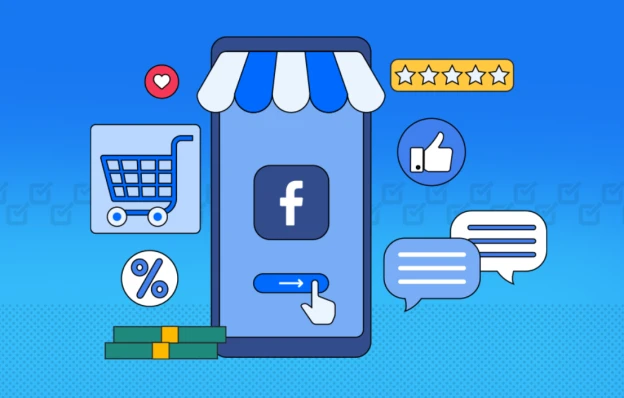
Using Social Commerce to Monetize Likes and Subscriptions
Social networks have long ceased to be just platforms for communication. In recent years, they have become a powerful tool for business, especially in e-commerce. Social commerce is one of the key trends that is actively developing and gaining popularity. It turns familiar likes and comments into real sales, which is becoming an important factor for companies in 2025. Brands are increasingly integrating social networks into their marketing strategies to directly interact with the audience and convert its engagement into profit.
We recommend promoting your brands using ready-made accounts on popular social networks (VKontakte, Telegram, TikTok, Instagram and others).*
Or you can use inexpensive virtual numbers to register on VKontakte, Telegram, TikTok, Instagram, Facebook.
The Importance of Social Commerce in 2025

The modern consumer market is rapidly changing, and social e-commerce is becoming an important part of this process. According to analysts, the number of social network users continues to grow, and by 2025 their number will reach more than 5 billion. This opens up broad prospects for businesses: brands can find and attract customers through direct sales via social networks, as well as use platforms for communication, advertising, and consumer behavior analytics.
One of the key advantages of social commerce is the ability to create a personalized experience for each customer. Social media platforms allow businesses to customize advertising campaigns to maximally match users' interests and needs. Moreover, thanks to modern algorithms and analytics, brands can track user behavior, their preferences, and engagement with content, which significantly increases the likelihood of successful sales.
Likes and Sales: Effective Conversion of Engagement

One of the main tasks for companies is not just to attract users' attention but to actively convert them into buyers. In 2025, various tools are used for this, ranging from targeted advertising to collaborations with influencers. But how exactly do likes and comments turn into sales?
Let's look at the main mechanisms.
- Targeted advertising. This is one of the most powerful tools in marketers' arsenal. Modern social media platforms provide the ability to set up advertising with a high degree of precision, showing it only to users who are genuinely interested in the product. This allows not only to save budget but also to increase conversion.
- Influencers and brands. Engaging influencers in marketing campaigns is another important aspect of social commerce. Thanks to the huge popularity of bloggers and opinion leaders, companies can effectively promote their products and services through their audiences. Consumers tend to trust recommendations from their favorite influencers more than traditional advertising, which significantly increases brand trust and willingness to make a purchase.
- Content monetization. In 2025, content will play a key role in sales. Companies will be able to monetize their content through posts, video reviews, live streams, and stories where users can directly purchase products. This makes the shopping process more natural and integrated into everyday use of social networks.
Social Commerce Platforms

A key aspect of success in social commerce is choosing the right platform to promote products. In 2025, several social media platforms will take the lead in functionality for online stores within social networks.
Instagram. This platform has remained a leader among visual social networks for many years and is an ideal space for brands promoting fashion, beauty, interiors, and other visually appealing products. With features like the "Instagram Shop," companies can create fully functional product showcases where users can browse and purchase items directly within the app. Moreover, promoting on Instagram allows brands to display their products in the news feed, stories, and even in recommendations, significantly increasing audience reach.
TikTok. With each passing year, TikTok is becoming an increasingly popular platform for brands, especially among younger audiences. Shopping on TikTok offers a unique experience where users can not only be entertained by watching short videos but also instantly buy products that interest them. The platform is actively integrating social shopping features, making it an excellent place for social commerce.
Facebook. Despite the rise of new platforms, Facebook remains a powerful tool for social e-commerce. Brands can create fully-fledged online stores on Facebook, utilizing product catalog capabilities, targeted ads, and integration with other services.
Each of these platforms has its unique features and audience, making them essential tools for companies aiming to successfully develop social commerce.
Sales Strategies for 2025

To succeed in 2025, companies must adapt their sales strategies to new trends and opportunities. The key aspects of a successful strategy include:
Personalization of advertising campaigns. Modern users value a personalized approach, which is why targeted advertising remains a crucial element of successful social commerce. Companies should develop ad campaigns that take into account users' interests, behaviors, and preferences to engage the audience more effectively.
Automation of customer interactions. In 2025, automating the shopping process and customer communication will become even more essential. Chatbots and voice assistants will help brands maintain constant contact with customers, quickly answering their questions and assisting with product selection. This will greatly enhance convenience and improve the overall customer experience.
Utilizing influencers. Influencers will continue to play a significant role in brand promotion. However, in 2025, companies will pay even more attention to selecting the right influencers whose audience matches the brand's target demographic. This will help boost the effectiveness of marketing campaigns and increase e-commerce conversion on social platforms.
Integration of online stores into social media. A key step forward will be integrating online store functionality directly into social media platforms. This will streamline the purchasing process, reducing the steps from product browsing to purchase. Platforms like Instagram and Facebook are already actively implementing such features, and this trend will only grow.
Using video formats for sales. Video content remains one of the most powerful tools for capturing users' attention. In 2025, special emphasis will be placed on video product reviews, live streams, and other video formats that help brands engage directly with their audience and sell products through social media.
The future of social commerce

In 2025, social commerce will continue to evolve rapidly, offering brands new opportunities to engage with customers. Companies that actively adopt innovative tools, such as targeted ads, influencers, and integrated online stores in social networks, will be able to turn likes and comments into real sales. The future belongs to those who adapt to new realities and use all the opportunities social platforms provide to maximize their success.
Social media is no longer just a communication tool; it has become a critical channel for business. Brands that can effectively leverage these opportunities will take leading positions in the market and achieve greater success in an increasingly competitive environment.


































